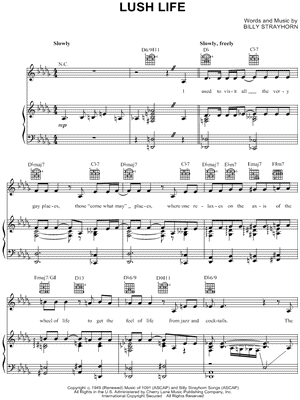"Lush Life" - Hartman and Coltrane
I used to visit all the very gay places
Those come-what-may places
Where one relaxes on the axis of the wheel of life
To get the feel of life from jazz and cocktails
The girls I knew had sad and sullen gray faces
With distingue traces that used to be there
You could see where they'd been washed away
By too many through the day, twelve o'clock tales
Then you came along with your siren song
To tempt me to madness
I thought for awhile that your poignant smile
Was tinged with the sadness of a great love for me
Ah yes, I was wrong
Again, I was wrong
Life is lonely again and only last year
Everything seemed so sure
Now life is awful again
A trough full of hearts could only be a bore
A week in Paris could ease the bite of it
All I care is to smile in spite of it
I'll forget you, I will while yet you are still
Burning inside my brain romance is mush
Stifling those who strive
So I'll live a lush life in some small dive
And there I'll be
While I rot with the rest of those
Whose lives are lonely too
 The song "Lush Life" is a jazz standard written by Billy Strayhorn in 1933-38. Along with "Take the "A" Train," "Lush Life" is one of Strayhorn's signature compositions, having been covered by many widely known musicians such as Nat King Cole, Ella Fitzgerald, John Coltrane, and Queen Latifah. The song has a low tempo, but is full of complex chord changes that result in a dreary, and almost dissonant sound at times. Listening to this song reminds me of Toni Morrison's novel Jazz because the frequent chord and key changes which constantly change the mood of the song echo the sporadic mood and perspective changing of the narrator in Morrison's novel. The lyrics of the song also parallel different themes, places and even characters from Jazz. The "come-what-may places" that Strayhorn refers to are the jazz clubs that were prevalent throughout the early 20th century. These are the very same jazz clubs that Dorcas was drawn to in her time with the Miller Sisters. Another theme the song and book have in common is the theme of loneliness and getting left by someone. Strayhorn states that he was wrong about the "smile tinged with great sadness of a great love," which parallels the dynamic between Dorcas and Joe. After Dorcas stopped seeing Joe, Joe could not stop thinking about her, much like how in the song, Strayhorn states that "Burning inside [his] brain romance is mush." The "Lush Life" that Strayhorn refers to in the final stanza of the song is a life of going to "dives," or jazz clubs. The significance in the title "Lush Life" for the novel written by Richard Price is that in the book, the lower east side is an incredibly dense and diverse area, and although the word lush literally means dense with vegetation, the lower east side is lush with an array of different backrounds, histories, and cultures.
The song "Lush Life" is a jazz standard written by Billy Strayhorn in 1933-38. Along with "Take the "A" Train," "Lush Life" is one of Strayhorn's signature compositions, having been covered by many widely known musicians such as Nat King Cole, Ella Fitzgerald, John Coltrane, and Queen Latifah. The song has a low tempo, but is full of complex chord changes that result in a dreary, and almost dissonant sound at times. Listening to this song reminds me of Toni Morrison's novel Jazz because the frequent chord and key changes which constantly change the mood of the song echo the sporadic mood and perspective changing of the narrator in Morrison's novel. The lyrics of the song also parallel different themes, places and even characters from Jazz. The "come-what-may places" that Strayhorn refers to are the jazz clubs that were prevalent throughout the early 20th century. These are the very same jazz clubs that Dorcas was drawn to in her time with the Miller Sisters. Another theme the song and book have in common is the theme of loneliness and getting left by someone. Strayhorn states that he was wrong about the "smile tinged with great sadness of a great love," which parallels the dynamic between Dorcas and Joe. After Dorcas stopped seeing Joe, Joe could not stop thinking about her, much like how in the song, Strayhorn states that "Burning inside [his] brain romance is mush." The "Lush Life" that Strayhorn refers to in the final stanza of the song is a life of going to "dives," or jazz clubs. The significance in the title "Lush Life" for the novel written by Richard Price is that in the book, the lower east side is an incredibly dense and diverse area, and although the word lush literally means dense with vegetation, the lower east side is lush with an array of different backrounds, histories, and cultures.
Queen Latifah's rendition of "Lush Life"
thanks for bringing this song to our attention, michael. i think it is useful for thinking through both morrison and price's novel. i would add that price is likely playing on the idea of a "lush" as s drunk. furthermore, this song and your reading of the two novels through it reminds me of a theme we have discussed before: the city as both a place of vibrancy and decay, and the thin line between those two sides of urban space.
ReplyDelete